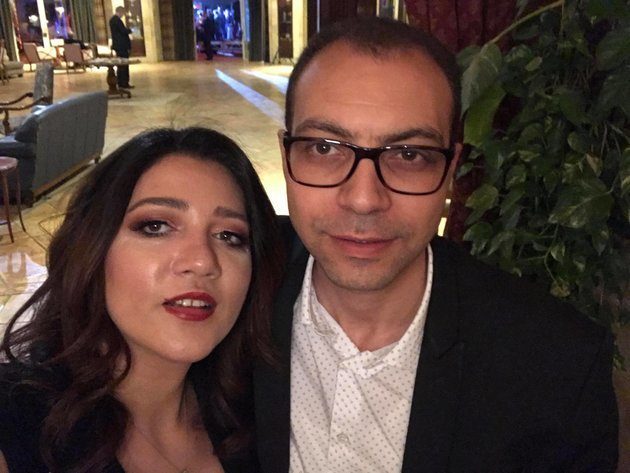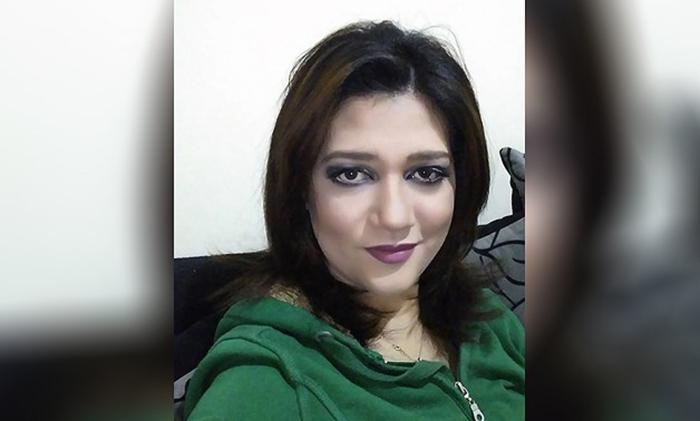31 Dec 2018 | Bahrain, Bahrain News, Campaigns -- Featured
[vc_row][vc_column][vc_single_image image=”103748″ img_size=”full” add_caption=”yes”][vc_column_text]
An Egyptian court on Sunday upheld a two-year prison sentence against activist Amal Fathy, who had been detained since May after posting a Facebook video that criticised sexual harassment in Egypt.
Her lawyer Ramadan Mohamed told Middle East Eye that her appeal had been rejected and that she would now serve jail time. Fathy is also accused of publishing offensive content, Mohamed said.
Jodie Ginsberg, CEO of Index on Censorship, said: “Index on Censorship is extremely disappointed at the decision to uphold the sentence against Amal. She should never have been charged or detained for expressing her opinion. All charges against her should be dropped and she should be released.”
Fathy and her husband Mohamed Lotfy, together with their young son, were detained after a night-time raid on their apartment on 11 May. Lotfy and the couple’s son were released after several hours, but Fathy has remained detained since then.
Following the Facebook video Ms Fathy was sentenced in September for “spreading fake news”. She also faced security-related charges, including for membership of a terrorist organisation.
Lotfy is co-founder and executive director of the Egyptian Commission for Rights and Freedoms, which received an Index on Censorship Freedom of Expression Campaigning Award in April 2018.
In May leading international human rights lawyers at Doughty Street Chambers, jointly with ECRF and Index on Censorship, lodged complaints with the United Nations rapporteurs on freedom of expression and human rights defenders regarding Fathy’s detention. In July, Doughty Street Chambers, ECRF and Index raised Fathy’s case with the United Nations Working Group on Arbitrary Detention.[/vc_column_text][vc_basic_grid post_type=”post” max_items=”4″ element_width=”6″ grid_id=”vc_gid:1546240564789-ca455c3f-0710-0″ taxonomies=”25926″][/vc_column][/vc_row]
20 Dec 2018 | Campaigns -- Featured, Press Releases

Amal Fathy with her husband Mohamed Lotfy
Index on Censorship and leading international human rights lawyers at Doughty Street Chambers welcome the news that Amal Fathy, detained for speaking out against sexual harassment in Egypt, is finally to be freed on probation.
Fathy was arrested in May 2018 after posting a Facebook video that expressed anger at the sexual harassment suffered by women in Egypt. Her husband Mohamed Lotfy and their young son were also held after a night-time raid on their apartment but were released after several hours. Fathy was charged with membership of a terrorist organisation and other related charges and has remained detained since then. A Cairo criminal court has now ordered her release.
Lotfy is co-founder and executive director of the Egyptian Commission for Rights and Freedoms (ECRF), which has played a key role in increasing awareness of enforced disappearances, censorship, torture and violations of freedom of expression and association in Egypt. This has led to frequent incidents of harassment, arrest and detention of staff. ECRF received an Index on Censorship Freedom of Expression Campaigning Award in April 2018.
In May, Doughty Street lawyers, jointly with ECRF and Index on Censorship, lodged complaints with the United Nations rapporteurs on freedom of expression and human rights defenders regarding Fathy’s detention. In July, Doughty Street Chambers, ECRF and Index raised Fathy’s case with the United Nations Working Group on Arbitrary Detention.
Mohamed Lotfy of ECRF said: “Amal should be released immediately and her probation lifted so that she can enjoy the full freedom she deserves. An acquittal on 30 December is long overdue.”
Jodie Ginsberg, CEO of Index on Censorship said: “Index on Censorship welcomes the news that Amal Fathy is to be freed. She should be released immediately to be reunited with her husband and son. Ms Fathy’s only ‘crime’ was to criticise the sexual harassment suffered by women in Egypt and the government’s failure to deal with it.”
Caoilfhionn Gallagher QC, Doughty Street Chambers said: “Amal Fathy has been detained arbitrarily for seven months, in unsanitary conditions, without meaningful access to her lawyers, and away from her family and young son. We welcome the court order to release her. We now call on the Egyptian authorities to comply with that order immediately and drop all outstanding charges against her. Amal Fathy should be free, and free to speak her mind – not behind bars, not on probation, and not stopped from speaking out on vitally important issues to Egyptian society, civil liberties and women’s rights.”
Amal Fathy will next appear in court on 26 December, with another court date currently set for 30 December on the related charges of “broadcasting a video harming national security”, “posting a video inciting to overthrow the regime and spreading false rumours”, and “misusing social media”.
18 Dec 2018 | Campaigns -- Featured, Statements
[vc_row][vc_column][vc_column_text]

Mohamed Lotfy (right) with his wife, the imprisoned activist Amal Fathy
A Cairo criminal court has ordered that Egyptian activist Amal Fathy, who was arrested on 11 May after posting a video criticising sexual harassment in Egypt, be released.
Rachael Jolley, editor of Index on Censorship magazine, said: “No one should face arbitrary detention for freely expressing their opinions, in this case about how she felt about being sexually harassed. These charges have never made sense. While we welcome the order to release Amal, she must now actually be freed and all charges against her dropped.”
Fathy stood accused of “belonging to a terrorist group”, “using a website to promote ideas calling for terrorist acts”, and “intentionally disseminating false news that could harm public security and interest”.
During her appeal session on 25 November, Fathy told the judge: “I am afraid to go out to streets alone, every time I walk in the street alone someone harasses me. Last time, my son was going to be kidnapped from my arms by a motorcycle rider in Mohandiseen area. I am afraid to get out of my house, but I had to get out that day.”
Fathy took a taxi to the bank and was sexually assaulted by the driver. A crowd gathered, but let the man go. “I was in a shock and tried to understand what just has happened,” she told the judge.
A police officer showed up at the scene. “I looked at him, he was opening his trousers’ zipper and saying to me come here and I will make you feel comfortable. I experienced another shock and started to shout and scream,” Fathy said. “I felt powerless and subjugated and that’s what I said in the video. I never felt safe as a woman in my country, and this is not the first time that this happens to me.”
Fathy’s husband Mohamed Lotfy said of the ruling: “I am delighted to inform you that today a Cairo Criminal court has accepted Amal Fathy’s appeal against her preventive detention and ordered her release on probation (in case 621 of 2018 state security prosecution). She should be released within the next few days and check in a couple of times every week at a police station. On 26 December she will appear in front of another Cairo Criminal court to (most probably) extend her period of probation in the same case. On 30 December, the Maadi Appeals Misdemeanor court will issue its verdict in the other case (case 7991 of 2018 Maadi Misdemeanors). Maadi Misdemeanor court gave her a 2 years prison sentence and a fine and bail to suspend the sentence until the appeals court issues its verdict. The bail and fine were paid and we are now awaiting the final verdict by the appeals court on 30 December.”
Doughty Street Chambers — along with ECRF and Index on Censorship — have worked together on this case by lodging complaints with the United Nations Special Rapporteurs on freedom of expression and the protection of human rights defenders. Additionally, they had an ongoing appeal against Egypt with the UN Working Group on Arbitrary Detention, which was being considered.[/vc_column_text][vc_basic_grid post_type=”post” max_items=”4″ element_width=”6″ grid_id=”vc_gid:1545208658227-39c5d90f-2d7b-3″ taxonomies=”25926″][/vc_column][/vc_row]
23 Nov 2018 | Campaigns -- Featured, Statements
[vc_row][vc_column][vc_column_text]
Index on Censorship and international human rights lawyers at Doughty Street Chambers condemn the continued detention of Amal Fathy – an Egyptian activist who made a video about her experience of sexual harassment.
Fathy was arrested on 9 May 2018 and has spent 200 days in detention on charges of “spreading fake news”. On 29 September she was given a suspended sentence of two years in prison on these charges with a £430 fine. Although Fathy was granted release on bail she remains in detention over further charges of “belonging to a terrorist group”, “using a website to promote ideas calling for terrorist acts”, and “intentionally disseminating false news that could harm public security and interest”.
She will appear in court on these charges on Sunday 25 November 2018.
“It is appalling that Amal Fathy remains in detention. Her ‘crime’ has been to speak out publicly about the sexual abuse faced by so many women in Egypt and she should be released immediately,” said Index on Censorship CEO Jodie Ginsberg.
Caoilfhionn Gallagher QC of Doughty Street Chambers said: “Amal Fathy has now been detained arbitrarily for 200 days, in unsanitary and unsafe conditions, without meaningful access to her lawyers, and away from her family and young son. She spoke out about the rights of women; now the Egyptian authorities are silencing her by holding her in prison for months on end, with no proper legal basis. The international community must now condemn Egypt’s flagrant breaches of her basic rights to liberty, due process and dignity.”
Fathy was initially arrested with her husband Mohamed Lotfy, and their two-year-old son. Their Cairo apartment was raided and searched. Lotfy, who leads the Index on Censorship Freedom of Expression Award-winning Egyptian Commission for Rights and Freedoms, which coordinates campaigns for those who have been tortured or disappeared, was later released.
Speaking ahead of Sunday’s hearing, Lotfy said: “The crackdown by the authorities on political dissidents and critical voices in Egypt spreads fear among society and violates the basic rights of freedom of expression. The authorities stick the label of ‘terrorist’ to those who peacefully express critical opinion regardless of the topic — political, social, economic, religious, or even on sport — using anti-terrorism legislation to prosecute and detain holders of such opinions. Not only this is a violation of the right to freedom of expression, but it is also counter-productive in the fight against terrorism. Amal Fathy is a blatant example of this confusion. She is a kind, peaceful and loving person, who suffered from sexual harassment and spoke out against it. She found herself accused of terrorism and detained now for six months.”
After months of pre-trial detention, Fathy’s first court hearing was on 11 August.
Fathy suffers from mental ill health, which has been severely exacerbated by her detention.
On 23 May 2018 Doughty Street Chambers — along with ECRF and Index on Censorship — lodged a complaint with the United Nations Special Rapporteurs on freedom of expression and the protection of human rights defenders on behalf of Fathy and her family. The organisations asked the two Special Rapporteurs to:
- gather, request, receive and exchange information and communications from the Egyptian Government in relation to this case;
- publicly make concrete recommendations to the Egyptian authorities on their duty to adhere to their international obligations; and
- issue an opinion finding that Egypt has failed to adhere to its own obligations, and violated the rights of the complainants, under international law.
On 24 July 2018 an appeal against Egypt was lodged by Doughty Street Chambers, jointly with ECRF and Index on Censorship, with another UN body, the Working Group on Arbitrary Detention. They have complained about Amal Fathy’s detention and called on the Working Group to issue a finding that her detention is arbitrary and in violation of Egypt’s obligations under international law, and to call for her immediate release, and to ask Egypt to investigate her unlawful detention and to award her compensation. The Working Group is considering the appeal.
Update: Amal Fathy’s trial has been postponed to 30 December.[/vc_column_text][/vc_column][/vc_row][vc_row][vc_column][vc_basic_grid post_type=”post” max_items=”4″ element_width=”6″ grid_id=”vc_gid:1543231190492-716c3068-6e3a-2″ taxonomies=”25926″][/vc_column][/vc_row]


